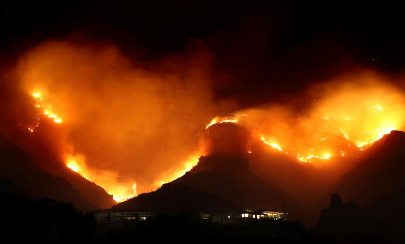-
Security
Out of the Frying Pan...
July 2020
"Out of the frying pan and into the fire." This common idiom has been uttered for nearly 500 years. The notion of getting into a worse predicament when trying to improve a situation has been happening for as long as humans have been making decisions. So why does this happen? How do we wind up in a place where the only options in front of us are bad and worse? How can we identify those situations and how do we avoid them?
I didn't just choose this picture to tie in my frying pan idiom. The picture was actually my inspiration for the post. In the picture, you can see a house with two small lit, square windows. Behind those windows, was a person I know and think highly of. This person is intelligent, has a background in planning, and has enjoyed decades of success in running a small business. This is a person who most would generally consider as being on top of things. However, on this day, this individual was comfortable, "safe", and oblivious of the threat looming just behind them.
It seems impossible to be unaware of such a situation, but that is exactly where many of us exist each and every day. We get focused on the things directly in front of us, the things that are our routine and of course, the "fire drills." The satisfactory results of each day allow us to become comfortable with how we handle, prioritize, and view everyday action and decision. We feel safe with the familiar and become complacent when the results are predictable and agreeable. This happens in our personal lives and professional lives alike, with consequences ranging from indifference to devastation.
Operating in the security space, as I do, a healthy (or perhaps unhealthy) dose of paranoia is part of the job description. Each day, there is a laundry list of controls that have to be checked to bring about some degree of assurance that nothing terrible is imminent. However, this is only good for known threats and familiar attacks. The real key to staying out of the frying pan and out of the fire is to become situationally aware. That is, to stay vigilant in monitoring not just what is in front of you, but also for indicators that new threats have emerged.
Becoming situationally aware is not a state, but a behavior – and I would argue a lifestyle. It takes effort and commitment to essentially always ask the question "what if?" and then to come up with an appropriate response. However, by doing this you will be far more prepared to handle an extraordinary circumstance when it presents itself. After all, the last time you looked out your back window, the 150,000-acre wildfire may have been obscured by mountains, but that doesn't mean it wasn't there, that it isn't coming, and that you shouldn't have been prepared for it!
Stay vigilant my friends.
-
Recent Articles
- Stop Wasting Time: Train Only on What You Don't Know
- AI for course creation? Let the trainer beware!
- Lessons from TD Bank
- Up Your FAQ — Part II
- Up Your FAQ (Financial Advisor Quotient)
